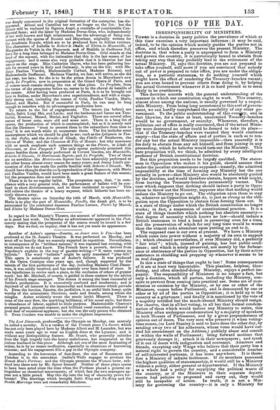Another of Auber's operas—Zanetta, ou Auer avec is Feu—has been
produced at the St. James's Theatre. It was performed on Monday, and went off so heavily that we scarcely expected its repetition. Nevertheless, in consequence of ite "brilliant success," it was repeated last evening, with what result we do not know. The French have a proverb, derived from Napoleon's exploits in the way of gazette-writing— ment comma un bulletin." The word " bulletin " might be aptly translated "play-bill." This opera is notoriously one of Auber's failures. It was produced at the Opera Comique nine years ago, and, though supported by the talents of the first performers of the day, including Madame Cinti-Damo- rean, it was coldly received, and has scarcely ever been heard of since. It was injudicious to revive such a piece, to the exclusion of others of greater merit: but Mr. Mitchell, of course, is guided in these matters by the advice of his French stage-manager. The drama is among the least successful of Scribe's productions. It is excessively confused and incoherent; and is deprived of all interest by the immorality and heartlessness which pervade it. Even the heroine, Zanetta, the jardiniere, is an artful little hussy, quite worthy of the aristocratic libertines, male and female, among whom she mingles. Auber evidently wrote the music invita Minerva. There is none of the easy flow, the sparkling brilliancy, of his usual style; but there is abundance of labour, applied to little purpose. Mademoiselle Charton's personal graces, piquant manner, and brilliant vocal execution, produced a good deal of occasional applause; but she was the only person who obtained it. Even Coudere was unable to make the slightest impression.






















 Previous page
Previous page